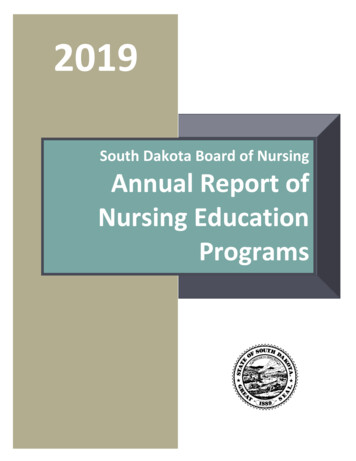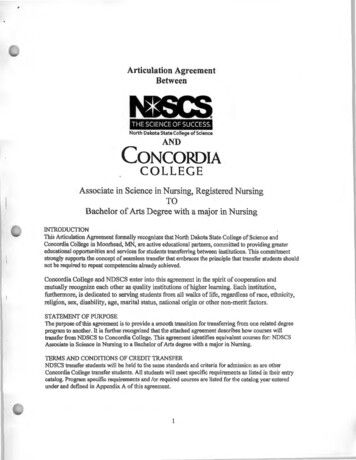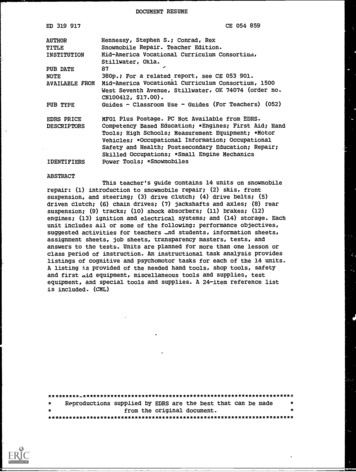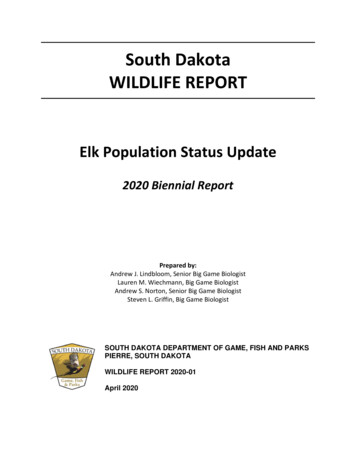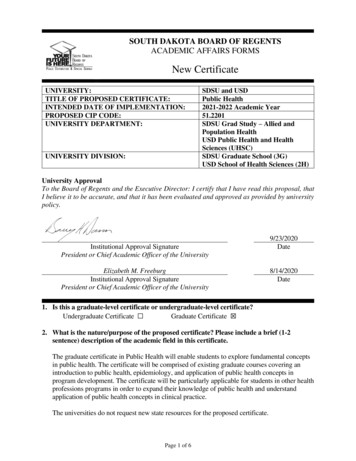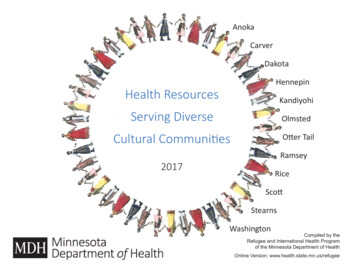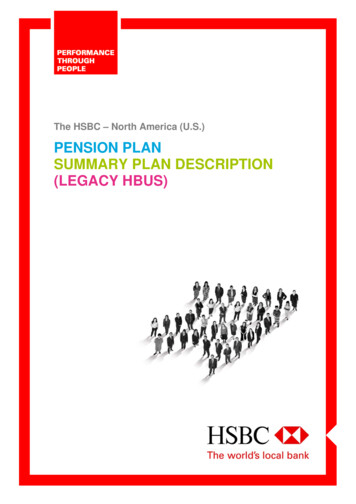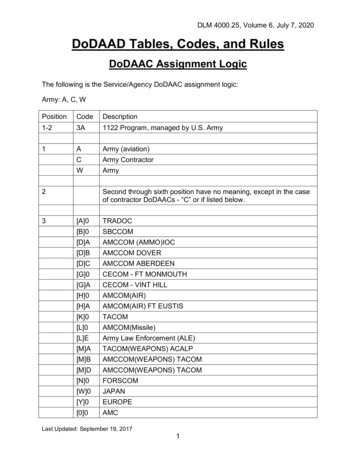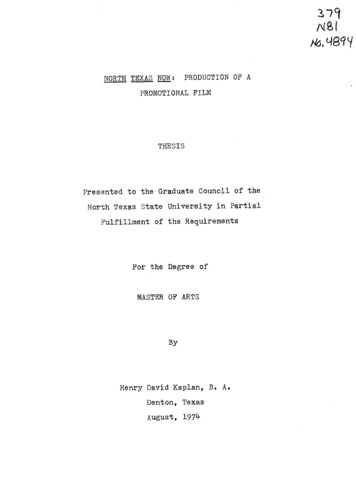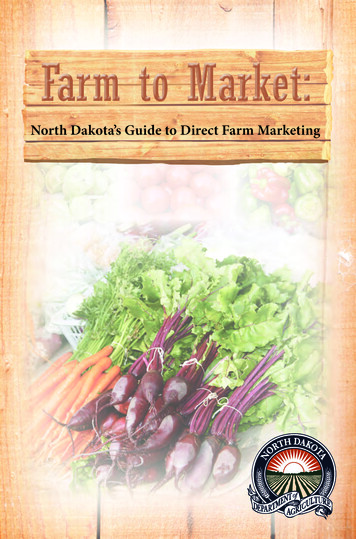
Transcription
TH DAKOTORANNorth Dakota’s Guide to Direct Farm Marketing
Table of ContentsIntroduction .1Direct Marketing . 2Taxes . 7Insurance .11Health and Safety Codes .12Industry Definitions .34Directory .35
North Dakota’s Guide to Direct Farm MarketingFarmers markets, roadside and farm stands, U-pickoperations, community-supported agriculture (CSAs), directsales to restaurants and stores, agri-tourism and education,and on-farm recreation are just some of the economicopportunities for farmers to diversify their operations byselling directly their products and services to consumers.Direct marketing also provides a direct connection betweenfarmers and consumers, offering personal, one-to-onerelationships, not often experienced in conventionalmarketing.This handbook will help you understand and comply withNorth Dakota state laws and regulations regarding the directsale of produce, meat products, baked goods and handmadeitems. Many other resources for beginners as well asseasoned agriculture entrepreneurs are available.All information provided here is subject to change. In theevent a law has changed since this book was printed, or aconflict does arise, the applicable state or federal law alwaysprevails.Revised 2013North Dakota Department of Agriculture - 1
Direct MarketingFarmers can reach their customers through a variety ofdirect marketing methods. Some are better suited to youroperation and products than others. For many farmers, acombination of several marketing outlets is most effective.Examples of direct marketing strategies include: Farmers markets U-pick Roadside stands Community Supported Agriculture (CSA) orSubscription Farming Community markets Retail outlets Chefs and restaurants Internet or mail order Cooperative marketing Consumer cooperatives Institutional sales (Grocery Stores, Schools or otherCommercial retail options)Farmers MarketsBy far the most popular way to sell produce during thesummer is through a farmers market. The North DakotaFarmers Market and Growers Association has informationon the benefits of joining or starting a farmers market at:www.ndfarmersmarkets.com.2 - Farm to Market
U-pick marketingU-pick means that farmers invite the public onto a farm toharvest their own food. Small fruits and berries, pumpkins,gourds and Christmas trees are examples of suitable cropsfor U-pick operations. U-pick can eliminate time harvestingcrops but may require additional time to manage thebusiness. Good maps and advertising are key to a successfulU-pick operation.Roadside and on-farm standsCheck with your county about zoning laws that may applyto this type of on-farm business. If you chose to sell morethan locally-grown produce, additional laws and regulationsmay apply. Good maps and advertising for your on-farmstand are essential.Agri-tourismEntertainment farming has become increasingly popular astourists look for authentic experiences. Cultural heritageand eco-tourism are buzz words in the travel industry, andpeople may be interested in on-farm activities like milkingcows or hoeing your garden. Check with local and stateagencies about insurance, zoning, ordinances, and businesslicenses that may be necessary for this type of business.Turning your farm into an entertainment venue requiresadditional increased bookkeeping, staffing, scheduling,advertising and working with the general public. Carefullyverify all aspects of an agri-tourism business beforeinvesting any money. For more information, visit:www.ndtourism.com/industry/agritourism/North Dakota Department of Agriculture - 3
Community Supported Agriculture (CSA)CSAs are the most direct way for growers and customers tobuild relationships. A customer purchases a share (or halfshare) in a farm and in return receives a weekly allotmentof in-season produce. Produce may be delivered straight tothe doorstep or made available at a central pick-up location,along with recipes or information about the farmer.As with any business relying on Mother Nature, theconsumer must understand the possibility of crop failure.Myth vs. factMyth: Some farmers believe they cannot sell their producedirectly to food service and retail customers. Some foodservice and retail customers also think it is illegal topurchase fruits and vegetables directly from farmers.Fact: The North Dakota Dept. of Health considers farmersapproved sources of fresh raw fruits and vegetables that theygrow themselves, however local health units and privatecompanies may have additional standards that need to befollowed. When marketing these products through differentchannels, farmers markets, institution, schools, retail foodor foodservice facilities, etc. a producer is encouraged towork with their local health unit and/or buyer on anyrequirements to facilitate a strong partnership and build alasting relationship. Local regulations on farmers marketsstart on page 20. Under proper inspection and licensing,meat, poultry, dairy and eggs can be marketed. Otherregulations apply once these products are processed.4 - Farm to Market
What do I need to know about direct farm marketing?Many laws and regulations pertain to the sale of food andfood products, and these laws and rules vary from stateto state. Local law can be more strict than federal law, butnever less strict.When in doubt, ask. Please refer to the contact informationbehind each section to learn more about the laws pertainingto your locale.Do I need a business license to sell at farmers markets?No. If you occasionally sell at farmers markets during thesummer months, you are not required to hold a businesslicense.If you use a business name, however, you should considerregistering that name with the state. For a 25 fee, you canregister your business name for five years. You do not haveto physically open a business. Registering a business nameprevents someone from using the same or a similar name.At the end of five years, you have the option of allowingthe registration to lapse or renewing for another five years.Information on types of businesses, a business name searchengine and forms to register your business name can befound at the North Dakota Secretary of State’s web site at:www.nd.gov/businessreg/registerTips for Successful Marketing Your best source of information may be talking withpeople who have been there. Network with others todetermine what might work best for you. Consistent, quality products attract repeat customers.North Dakota Department of Agriculture - 5
Set your prices and stick to them. Work with fellow vendors in setting fair prices forproducts. Everyone needs to work together to establishquality market standards. Maintain and update your customer list. Use it to e-mailreminders, market openings, special events and newproduct information. This builds relationships that last alifetime. Watch market trends. Read about food trends and beflexible and willing to try new things. Consider adding value to your products with gift cards,specialty items, newsletters, recipes, special requests, etc. Creative packaging, signs and displays can make yourbusiness stand out in a crowd. Be organized; set up early, and be prepared to make thatfirst sale of the day. Tell your story with photos of your day-to-dayoperation. A picture is worth a thousand words. Advertise, advertise, advertise – never assume customersknow you are there. Take advantage of free publicservice announcements, send press releases and placesigns whenever and whereever you can. Know your product; you are its best advertising.NOTES6 - Farm to Market
TaxesDo vendors need tax permits?Vendors who sell taxable items must have a sales taxpermit. Sales tax permits are free. Application information:www.nd.gov/tax/salesanduse/formsThe permit requires filing a return, by paper orelectronically, at least once per year depending on salesvolume.If a vendor attends a special event and does not have apermit number or did not provide their permit number tothe organizer, they may be contacted by the tax department.If the tax department determines their product is taxable,vendors will have the opportunity to apply for a permit. Iftheir sales are nontaxable, they will have the opportunity toexplain why.If you have other questions, please contact the NorthDakota State Tax Department at:600 E. Boulevard Ave.Bismarck, ND 58505-0599Phone: 701-328-7088 or 877-328-7088Visit www.nd.gov/tax or send a question by e-mail,salestax@ndgov.North Dakota Department of Agriculture - 7
Examples of taxable versus non-taxable salesNo sales tax collectedFarmers market vendors who sell only fresh produce to becooked or consumed at a later date do not need to apply fora sales and use tax permit. Produce vendors selling tangiblepersonal property other than produce may have a sales taxcollection responsibility and should comply with the rulesabove. This would include any handmade or hand-crafteditems.Bakery items, such as bread, rolls, muffins, cookies and bars,are not taxable unless they are sold with eating utensils bythe seller or sold in a heated state.Sales of food supplies and groceries to either a public orprivate school for the operation of a school lunch programare exempt from sales tax.No sales tax applies when purchases are made using SNAPor WIC food vouchers.Prepared food is taxablePrepared foods are subject to sales tax. Prepared foodincludes food sold in a heated state or heated by the seller, orfood that is prepared by mixing or combining two or morefood ingredients for sale as a single item, or food sold witheating utensils, such as plates, knives, forks, spoons, glasses,cups, napkins, or straws provided by the seller.Food sold in an unheated state by weight or volume as asingle item is taxable only if sold with eating utensils.8 - Farm to Market
Taxable food also includes meals, sandwiches, or other foodintended for consumption on or near the seller’s premises.Be aware that health code regulations would becomeapplicable to items such as these.What is the farmers market manager’s responsibility tothe tax department?Farmers markets are considered to be special events if theyare held at the same location on a reoccurring or irregularbasis.Promoters of special events, including farmers marketmanagers, are required to collect certain information fromthe vendors on behalf of the North Dakota State TaxDepartment.Special events with 10 or more vendors must provide thetax commissioner’s office with a list of names and contactinformation of the participants within 20 days of the event.The required form for collecting vendor information the Special Event Vendor Listing – is available at .html. Theinformation may be submitted online or mailed.Organizers are responsible for requesting all vendorinformation needed to complete the Special Event VendorListing form.Organizers may be subject to a 250 penalty for failing toprovide the Special Event Vendor Listing form to the taxdepartment. If there are less than 10 vendors at the event,the form is not required, but written notification of less than10 vendors at the event is required. This notification may bemailed or emailed.North Dakota Department of Agriculture - 9
Reporting income from sale of produce or other items atfarmers marketsIf you derive income from sources other than your mainsource of employment, the Internal Revenue Service wantsto know.Income from the sale of any products, independent of thesales tax collection requirements, must be reported.Keeping records of input costs and sale of goods at farmersmarket or directly from your farm can be beneficial at taxtime. Taking the time to keep good records can pay off inthe long run as you begin to build your business.For more information, visit: 10 - Farm to Market
InsuranceDo I need special insurance for farm to market sales?North Dakota does not require anyone to purchase insuranceon anything except motor vehicles. Certain agencies orbanks may ask for proof of insurance. Conditions of alicense may be hinged on insurance. A farmers marketorganizer, city, or the owner of the property used for amarket may ask for proof of insurance before allowing amarket to operate.It is better to consult an insurance carrier before an incidentthan to wait until something happens. Ask yourself “howmuch can I afford to lose?”Every insurance company differs in what it can and cannotinsure. There are many types of insurance coverage, ridersand special one-time policies available. Before investing ina new business, you should also contact local governingbodies to inform them of your plans.(The North Dakota Insurance Department overseesindividual companies that do business in the state, but theydo not have information about individual coverage.)Questions to ask your agentIt’s important that you talk with your agent to have acomplete understanding of your risks and liabilities. Hereare some questions to ask: When does my homeowner’s policy no longer cover myinvolvement with direct farm marketing?North Dakota Department of Agriculture - 11
Can my homeowner’s policy be extended to cover myactivities (with additional premiums)? Is there a limit to the amount or type of direct farm salesI can make and still have them considered as incidentalto my farm operation? If I have a farm policy, does my liability cover directfarm marketing activities, such as roadside stand, U-pickoperations, delivery to restaurants and farmer’s markets?What activities are excluded as a “separate business” forwhich I need a commercial policy? Could a commercial business policy be better for myactivities? If my farm liability policy does not cover sales at thefarmers market, what type of policy should I buy for thispurpose? Would it cover product liability? Does my farm liability policy cover agri-tourism?(customers who pay to visit my farm, customers whosleep on the premises) Does my farm liability policy include coverage forproduct liability? Does my automobile insurance cover the use of farmvehicles for deliveries made by employees and familymembers? How should I insure my buildings and equipment? Isthere a “co-insurance” provision in my policy, whichrequires me to pay part of any loss? When I decide to hire employees for my activities, do Ineed to change my insurance policy from homeowners tofarm or commercial?12 - Farm to Market
Are volunteers and interns covered by my policy? Is my policy a “claims and occurrences” policy; whendoes coverage end and what happens if I changeinsurers?NOTESNorth Dakota Department of Agriculture - 13
Health and Safety CodesState and local laws governing what can be legally soldwithout inspection or licensing at a farmers market.State law (NDCC 23-09.2) enables the North Dakota StateHealth Department to offer educational support to foodpreparers not regularly engaged in the business of preparingand selling food to consumers such as through farmersmarkets, bake sales or similar enterprises in lieu of theavailability of facilities designed for food preparation. Thissupport is limited to non-potentially hazardous items.North Dakota has three city/county health departments;one city/county health district; seven multi-county healthdistricts; six single county health departments; and 11 singlecounty health districts in the state. These health units canimplement local ordinances that are more restrictive thanthe state’s, but not less restrictive. Because local health unitsmay have different requirements, there may be discrepanciesin what is currently being sold at farmers markets. Checkwith your districts health department if you have anyspecific questions.Please note: The guidelines in this document are subject tochange. Please contact your local public healthunit if you have questions.General guidelines for selling food at farmers marketsProduce – All produce sold for individual consumer use isacceptable to sell at a farmers market.Baked goods – All non-potentially hazardous baked goodscan be sold at farmers markets. Only baked goods sold to14 - Farm to Market
be eaten off site are considered non-prepared food items.Anything sold with eating utensils is subject to sales tax. Potentially hazardous baked goods include: KuchenCrème piesAny item requiring refrigerationJams and jellies – Jams and jellies have less potential forcontamination because of the high sugar content and areapproved to sell at farmers markets.Pickles – Some health departments forbid the sale of picklesat farmers markets. Check with your local unit.Eggs – Eggs may be sold directly from the producer tothe consumer, either off the farm or at a farmers market.Eggs sold to consumers through institutions, or via retailmust be licensed through the North Dakota Department ofAgriculture.The North Dakota Department of Agriculture issuespermits for the sale of eggs after inspection of premises.Eggs must be sanitized, candled, placed in new cartons andkept in a refrigerator that does not contain food productsbefore sale.At a farmers market it is suggested, eggs should be cleanedand kept refrigerated with an ambient air temperature of 41degrees Fahrenheit or less to prevent the spread of bacteria.Permits to sell eggs are 10 and can be obtained by contactingthe North Dakota Department of Agriculture at 701-328-2231or Wayne Carlson, Program Manager/Dairy, 701-328-4761,or e-mail: wcarlson@nd.gov.North Dakota Department of Agriculture - 15
Poultry – A farmer may sell up to 1,000 chickens off thefarm without inspection provided that the slaughter andprocessing are conducted under sanitary standards, practicesand procedures, the producer is registered with the NDDepartment of Agriculture and that accurate records of allpoultry sold are kept. A producer may also apply for anexemption allowing the sale of up to 20,000 birds annuallywith a quarterly inspection of the facility. To apply for anexemption, visit: www.nd.gov/ndda/program/meat-inspection.Officially inspected poultry must be kept frozen at zerodegrees Fahrenheit and must be labeled with: The true name of the product Ingredients if applicable Name and address of processor Net weight Inspection legend Safe handling instructionsMeat – Only meat products processed under federal or stateinspection may be sold at farmers markets.Selling meat in North Dakota also requires a retail meatlicense available from the North Dakota State HealthDepartment Food and Lodging Division: 701-328-1291, tollfree 800-472-2927.State-inspected meat cannot be sold in other states unlessthe processor operates as a “Selected Establishment.”A list of North Dakota’s 15 state-inspected processing plantscan be obtained from the Agriculture Department inspection/north-dakota-meat-processors16 - Farm to Market
State or federally inspected meat must be kept frozen at zero(o) degrees Fahrenheit and must be labeled with: The true name of the product Ingredients if applicable Name and address of processor Net weight Inspection legend Safe handling instructions. To insure there are noquestions the below five arrowed statements all needto be included, nothing should be omitted. Safe Handling Instructions: This product wasprepared from inspected and passed meat and/orpoultry. Some food products may contain bacteriathat could cause illness if the product is mishandled orcooked improperly. For your protection, follow thesesafe handling instructions. Keep refrigerated or frozen. Thaw in refrigerator ormicrowave. Keep raw meat and poultry separate from other foods.Wash working surfaces (including cutting boards),utensils, and hands after touching raw meat or poultry. Cook thoroughly. Keep hot foods hot. Refrigerate leftovers immediatelyor discard.For more information about labeling, visit www.nd.gov/ndda/program/meat-inspection or contact Dr. AndreaGrondahl, DVM, at the North Dakota Department ofAgriculture, 701-328-4762 or 800-242-7535.Fish – Fish may not be sold unless commercially farmed orlegally caught and harvested.North Dakota Department of Agriculture - 17
Mushrooms – Species harvested in the wild must beindividually inspected and deemed safe by an approvedmushroom identification expert.Beverages – Allowed beverages are limited to black coffee,hot teas, iced teas, lemonade, and canned or bottled soda orwater. Beverages that are not approved to be sold, includebut are not limited to: Raw milk Sun tea Kombucha tea Homemade juices Espressos, lattes, etc Homebrew beer or wine Bottled water from a private well Any other beverages made from a private wellProducts not allowed for sale: Canned meats Canned vegetables Wild game Raw milk Cut samples without permission and proper training inyour health district.Charitable Donations – North Dakota Century Code (1905.1-01-05) allows gleaners of agricultural crops to donateperishable food items to local food pantries. Pantries areallowed to distribute these donations free of charge. State18 - Farm to Market
and local health departments are available to inspect thefood before distribution if questions about its safety arise.Resale – If you are purchasing large lots of products such asdried fruits or nuts and creating smaller packages for saleyou must label individual lots with: Common name of food or identifying statement If multiple ingredients, a list in descending order of thepredominance by weight Any artificial color or flavorings An accurate weight Name and place of the food source for each major foodallergen in the food unless that ingredient is part of thename Name and place of business of manufacturer, packer ordistributorGrading Produce – If you are planning to market to schoolsand institutions, it is important to understand the USDA’sfruit and vegetable grading standards as many bids willspecify grade. All U.S. grade standards are available at:www.ams.usda.govOnce at the site search for fruit and vegetable grading in thesearch bar in the upper left.NOTESNorth Dakota Department of Agriculture - 19
Guidelines specific to locationBismarck Fire DepartmentEnvironmental Health Division1020 East Central AvenueBismarck ND 58501701-355-1418www.bismarck.orgEmail: Anton Sattler: asattler@nd.govNo permit is required for selling only whole/uncut fruitsand vegetables.Farmers Markets that sell home-canned, home-bakedfoods or eggs must have a temporary food permit. Theorganization can apply for a permit and the group ormarket manager will be responsible to police the vendors.The cost is 75 for the year. All permits expire at the endof December. To obtain a permit call Anton Sattler withBismarck’s Environmental Health Division at 701-355-1418.Spot checks performed.ALLOWED:Whole/uncut fruits and vegetables, honey, eggs sold byflock owner/producer directly to the customer. Eggs must bemaintained at 41 F or less and cannot be in water.Home-baked foods that do not require refrigeration whichmay include but are not limited to: lefse, bread, rolls, fruitpies, candies/confectioneries, cookies and bars.Home-canned high acid foods such as: sweet or dill pickles,tomatoes, salsa, apples, cherries, grapes, plums, peaches,flavored vinegars, naturally fermented foods such assauerkraut, pickles and KimChi.20 - Farm to Market
Any other home-canned fruits or vegetables can be sold onlyif the pH has been reduced to 4.6 or less AND the vendorhas documentation that the recipe and manufacturingprocess has been reviewed by a person knowledgeable inthe food canning/processing industry and recognized as aprocess authority.Note: Vendors selling home-canned or home-baked itemsmust label each food container and/or food item with thefollowing statement using a font size that is prominent,conspicuous and easy to read: “These food products wereproduced in an uninspected home kitchen where majorfood allergens may also have been handled and prepared,such as tree nuts, peanuts, eggs, soy, wheat, milk, fish, andcrustacean shellfish.” The vendor must also display a signor placard at the point of sale which states: “These cannedgoods/baked goods are homemade and not subject to stateinspection”NOT ALLOWED:Cut SamplesFoods that require refrigerationFresh-processed (not canned) foods that require refrigerationsuch as fresh salsa, pesto, etc.Foods that are home-processed or home-canned such ashome-canned fish, pickled eggs and meat.Home-baked foods such as custards, custard-filled pastries,meringue-topped pies or pastries, kuchen, pumpkin pies,cream pies or other pies, pastries or baked goods that areconsidered potentially hazardous or require temperaturecontrol.North Dakota Department of Agriculture - 21
Fish, fish eggs, sandwiches, dairy, poultry, meat productsincluding: smoked fish, butter, raw milk, jerky, potentiallyhazardous products such as garlic and oil mixtures or otherflavored oils.Any non-acidified foods processed by either the use of aboiling water bath or by the use of a home pressure cooker.Cavalier CountyNo permits required and no regular inspections of markets.Please refer to North Dakota Department of Healthregulations for guidance. Will investigate complaints.Central Valley Health DistrictBarnes, Dickey, Foster, LaMoure, Logan, McIntosh,Stutsman and Wells Counties122 2nd St. NWPO Box 880Jamestown ND g/EnvironmentalHealth.htmEmail: Marcie Bata: mabata@nd.govNo permit required and no regular inspections.ALLOWED:Whole fruits and vegetables, pickles (final pH 4.6 or less),jams and jellies, bakery items (may include but not limitedto lefse, bread, rolls, fruit pies, candies/confectioneries, andcookies/bars).22 - Farm to Market
NOT ALLOWED:Beef, poultry, fish, wild game, dairy products/cheese, eggs,prepared foods such as sandwichesCut samples are allowed with proper training and handling,be sure to call for a complete list of requirements and/ortraining.Follow labeling requirements as set forth by Division ofFood & Lodging in their guidance document.Custer Health UnitMorton, Mercer, Grant, Oliver and Sioux Counties and thecity of Mandan210 2nd Ave. NWMandan ND 58554701-667-3370, 1-888-667-3370www.custerhealth.comEmail: Paige McDaniel: paige.mcdaniel@custerhealth.comWe do not do permits or have regular inspectionsALLOWED:Foods that have a natural pH of 4.6 or less and acidifiedfoods which have acid(s) or acid food(s) added. The finalpH of the food must be 4.6 or less.Home-baked foodsMay include but are not limited to lefse, bread, rolls,fruit pies, candies/ confectioneries, and cookies & bars.Home-canned high acid foodsMay include sweet or dill pickles, tomatoes , salsa,apples, cherries, grapes, plums , peaches, flavoredvinegars, naturally fermented foods such as sauerkrautpickles and KimChi.North Dakota Department of Agriculture - 23
NOT ALLOWED:Cut SamplesFoods that require refrigerationFresh-processed (not canned) foods that require refrigerationsuch as fresh salsa, pesto, etc.Foods that are home-processed or home-canned such ashome-canned fish, pickled eggs and meat.Home-baked foods such as custards, custard-filled pastries,meringue-topped pies or pastries, kuchen, pumpkin pies,cream pies or other pies, pastries or baked goods that areconsidered potentially hazardous or require temperaturecontrol.Fish, eggs, sandwiches, dairy, poultry, meat productsincluding: smoked fish, butter, raw milk, jerky, potentiallyhazardous products such as garlic and oil mixtures or otherflavored oils.Any non-acidified foods processed by either the use of aboiling water bath or by the use of a home pressure cooker:Some foods naturally have a pH of 4.6 or greater, andthese foods are not allowed unless the pH of these foodsis reduced to pH 4.6 or less including:Artichokes, asparagus, beans (lima, string, kidney,Boston style, soy, waxed), beets, broccoli, Brusselssprouts, cabbage, carrots, cauliflower, horseradish,sweet corn, eggplant, mushrooms, peas, most peppers,potatoes, squash, spinach, vegetable soups.24 - Farm to Market
Fargo Cass Public Health401 3rd Ave. NFargo ND 58102701-241-1360www.cityoffargo.com/healthEmail: Doug Jensen: dejensen@cityoffargo.comNo permit require and no regular inspections.ALLOWED:Whole fruits and vegetables, pickles, jams, jelly, honey andbakery itemsALLOWED WITH PROPER HANDLING:EggsALLOWED WITH INSPECTION:Beef, poultry, fish, dairy/cheese and prepared foods such assandwichesCut samples will be allowed with proper trainingand handling, be sure to call and for complete list ofrequirements and/or training.NOTE: Meat, poultry, fish and dairy products checked(NOTE:as “with inspection” refers to those under federal or stateregulatory authority whereas prepared food service activitywould be under local regulatory authority. Although regularinspections are not conducted at the farmers markets, thedepartment is available to answer any questions vendorsmay have regarding safe source, handling, and display offood. While markets are not required to register with FargoCass Public Health, it is appreciated when our office isnotified when and where someone will be operating.)North Dakota Department of Agriculture - 25
First District Health UnitBottineau, Burke, McHenry, McLean, Renville, Sheridanand Ward Counties including the city of Minot801 11th Ave. SWPO Box 1268Minot ND 58702701-852-1376www.fdhu.orgEmail: Jim Heckman: jheckman@nd.govNo permit required for uncut, raw fruits and vegetables orfor eggs sold by the flock owner/producer. Any other foodsfall under regulation
eating utensils, such as plates, knives, forks, spoons, glasses, cups, napkins, or straws provided by the seller. Food sold in an unheated state by weight or volume as a single item is taxable only if sold with eating utensils.
